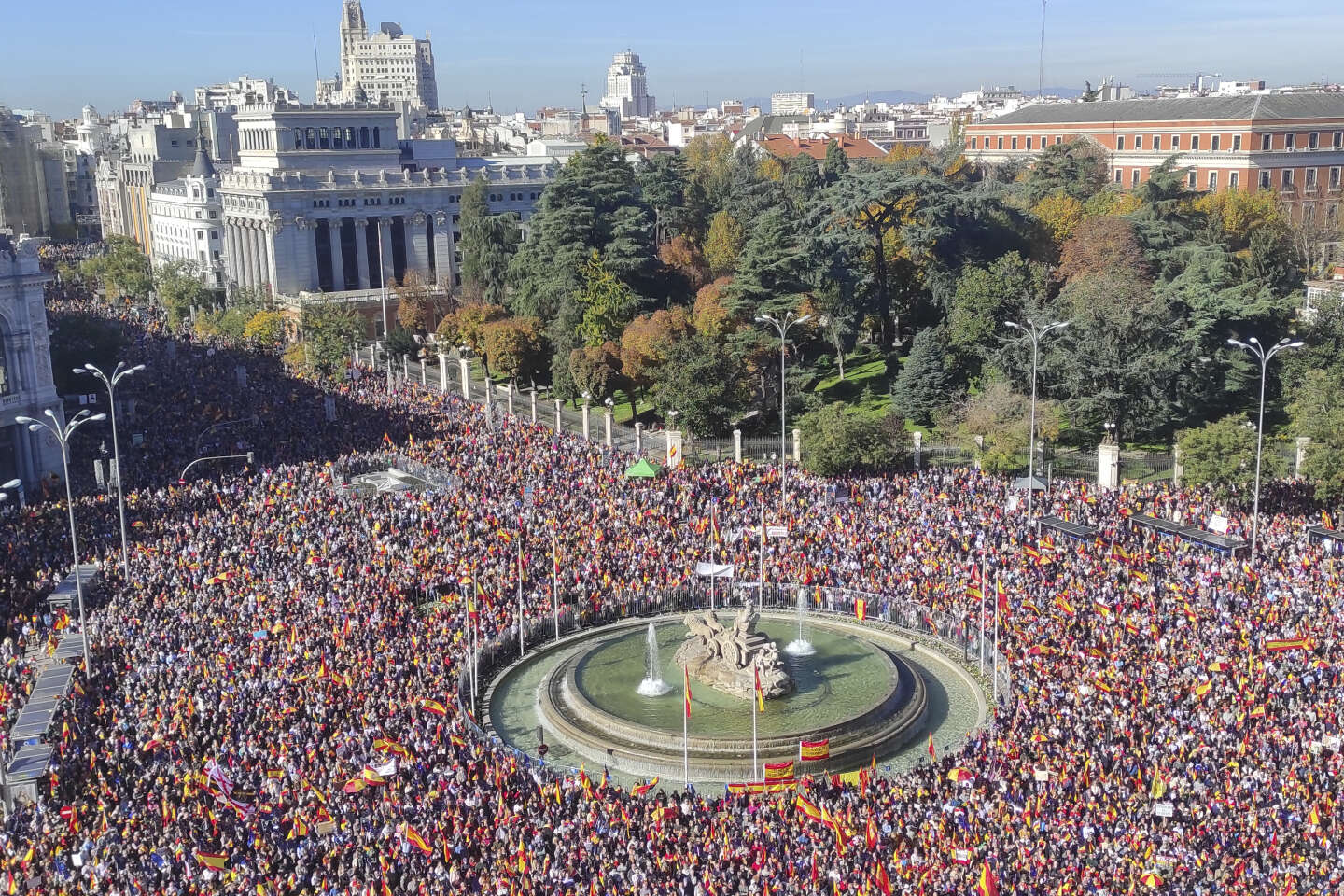Tens of thousands of protesters around 170,000 flooded the streets of Madrid on November 18, 2023, to denounce a proposed amnesty law for Catalan separatists and activists. The contentious law, a component for the left-wing government’s grip on power, has the largest protest in Spanish history.

Also Read: Liberia Election: George Weah Concedes to Joseph Boakai in Polls
This deep divisions within the country over the issue, pitting supporters of Prime Minister Pedro Sanchez against a coalition of right-wing leaders who view the amnesty as a threat to the nation’s unity.
The roots of this protest lie in the aftermath of the July parliamentary elections where Prime Minister Sanchez, in power since 2018, secured a second term.
However, his victory was not without compromise. In a move to secure support from regionalist groups, including Catalan pro-independence parties, Sanchez agreed to a series of concessions.
The contentious among them was the adoption of an amnesty bill aimed at absolving separatist leaders and activists who faced prosecution for their roles in Catalonia’s tumultuous 2017 secession attempt.
The protest organized by right-wing leaders opposed to the amnesty plan, saw converging in Plaza de Cibeles, a location in the heart of Madrid.
The crowd, spanning across generations, voiced their dissent with chants such as “Sanchez, traitor,” “Sanchez in jail,” and “Catalonia is Spain.” Protesters displayed Spanish and European flags distributed by the European People’s Party.
Among the figures present at the protest were Alberto Nunez Feijoo, leader of the opposition conservative People’s Party, and Santiago Abascal, leader of the far-right Vox party.
Also Read: Russia Files Lawsuit in Supreme Court for LGBTQ+ Rights
Both leaders, although not attending together, voiced sentiments conveying the amnesty law as a threat. Abascal went so far as to label the law “as serious as a coup d’etat”.
Sanchez’s success in securing his position as prime minister, has drawn criticism. The Prime Minister, who came second in the parliamentary elections, managed to clinch victory by aligning with regionalist groups, particularly those advocating for Catalan independence.
Critics argue that Sanchez’s concessions, especially the amnesty bill, a willingness to compromise national unity for political survival.
The protest on November 18 culmination of weeks of public discontent. Demonstrations had been a daily occurrence for the past two weeks in front of the Socialist Party headquarters in Madrid.
Some of these protests turned violent, resulting in arrests and the intensity of public sentiment against the amnesty law.
Opposition leader Alberto Nunez Feijoo accused Sanchez of attempting to divide Spain by supporting the separatist cause.
He argued that Sanchez’s reliance on regionalist groups for a governing majority was a divisive strategy that pits Spaniards against each other.
Also Read: APEC Summit: Joe Biden and Xi Jinping Meets Amid US-China Tensions
The opposition contends that the demonstration, with its massive turnout, serves as a clear message to the government that they lack popular support for such a controversial move.
The proposed amnesty law, if enacted, would be the largest in Spain since the 1977 blanket amnesty for crimes committed during the Francisco Franco dictatorship.
Moreover, it would be the first amnesty law approved in the European Union since 1991, prompting comparisons to historical contexts.
Critics argue that equating the amnesty with the Franco-era pardons injects controversy into an already polarized debate. Prime Minister Pedro Sanchez, despite facing criticism, has defended the amnesty law.
Sanchez contends that the amnesty is a necessary step to defuse tensions in Catalonia, addressing the potential for reconciliation and national healing. This argument, however, is met with skepticism from a portion of the Spanish population.
A mid-September survey by Metroscopia revealed that approximately 70% of respondents, including 59% of socialist supporters, were against the idea of an amnesty.
This disapproval from within Sanchez’s own political base signals a challenge for the government in maintaining public support.
Also Read: France Issues Arrest Warrant for Syria’s President Bashar al-Assad

/cloudfront-us-east-2.images.arcpublishing.com/reuters/ETZIKTOIJFJPZHMXI4KXH34O7M.jpg)





















